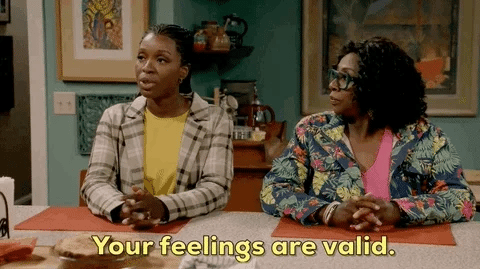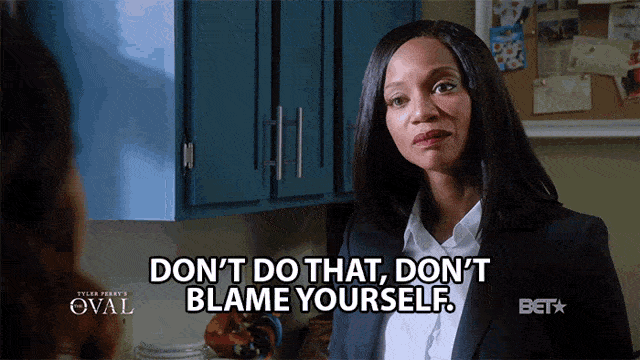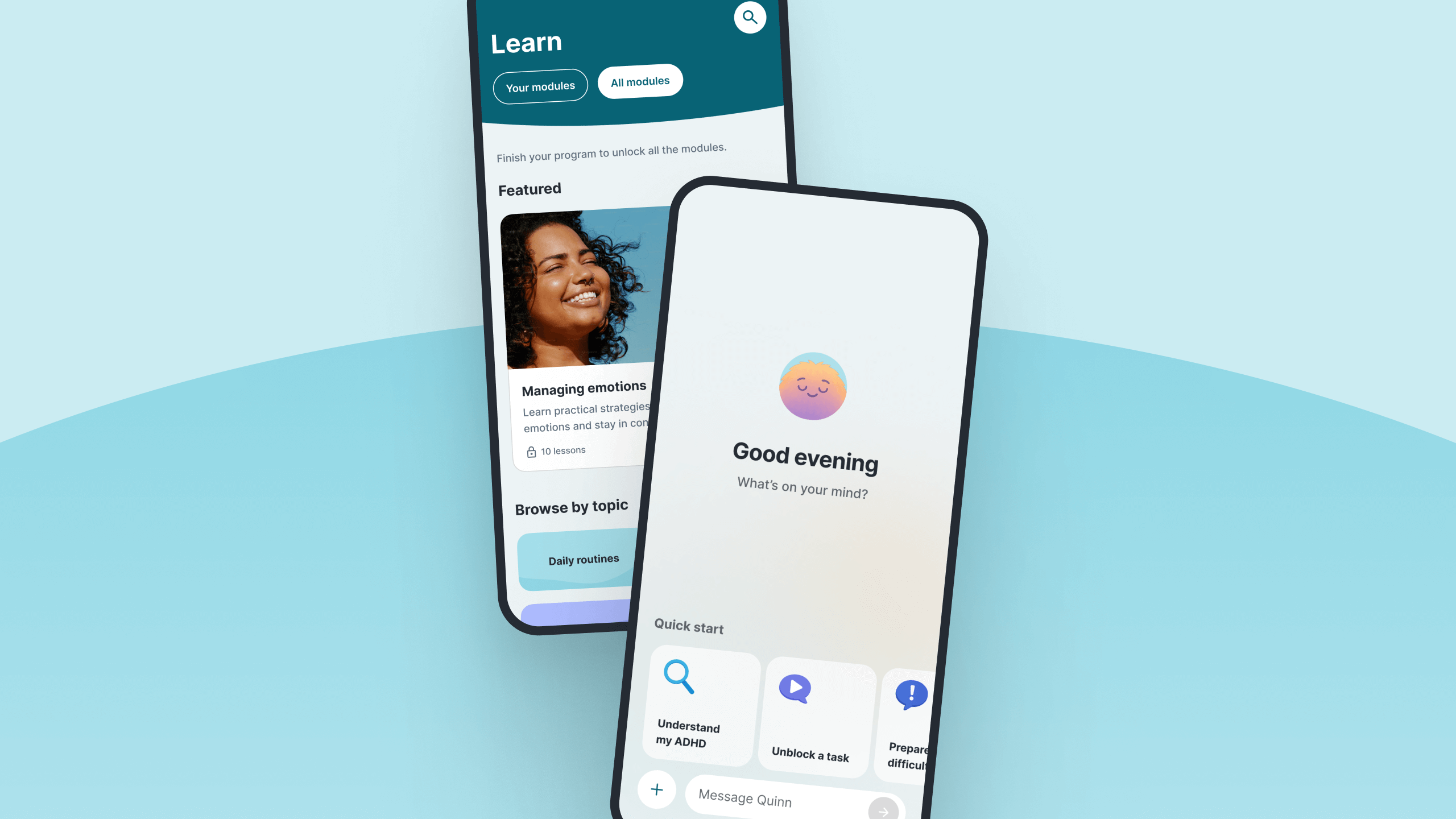Imposter syndrome, a nagging sense of feeling like a fraud — despite notable accomplishments — has long been associated with high achievers. However, people from all walks of life, including people with ADHD (like me), can fall into this trap where we question the reality of our struggles in daily life.
Getting my ADHD diagnosis as an adult was eye-opening. It also unraveled a web of self-doubt.
I began questioning the validity of my ADHD diagnosis almost immediately, mainly because I don't fit the stereotypical image of ADHD often portrayed by the media. The lack of representation and the mental health stigma within minority communities added to my doubts, making it even harder to accept my diagnosis.
I felt like an ADHD fraud—like I was faking it. Because - while being diagnosed with ADHD felt validating - once the gratitude of the diagnosis subsided, I was left with a lot of doubts about myself and my diagnosis.
If you've ever thought to yourself: "Maybe it's not ADHD; maybe I'm just not trying hard enough," you're not the only one.
Get ready for a deep dive into the link between ADHD and imposter syndrome. I'll share my personal battles with stigma and doubt, recount the emotional rollercoaster of receiving a late diagnosis as an adult, and reveal strategies to silence the voice in your head that insists you can conquer ADHD through sheer willpower alone.
Too long; didn’t read
- Imposter syndrome is a psychological pattern where someone feels like a fraud and fears being ‘found out’, despite having clear evidence of their own skills and accomplishments.
- Anyone can experience imposter syndrome, but certain groups are more likely to have it, such as people from marginalized communities, professionals, and ADHDers.
- ADHD imposter syndrome: when someone doubts that they actually have ADHD due to internalized negative messages, guilt, and shame.
- Overcoming ADHD imposter syndrome starts with understanding ADHD and how it affects you. (More coping strategies below!)
A note on spelling: Both ‘impostor’ and ‘imposter’ are accepted spellings of the word and mean the same thing. For this article, we’ve chosen to use imposter, except for direct quotes using impostor.

What is imposter syndrome?
Imposter syndrome, or imposter phenomenon, is a psychological pattern where a person doubts their abilities and feels like a fraud, even when they’re skilled and accomplished. It's like feeling that you don't deserve success or recognition, and believing that others will eventually discover you're not as competent as they may think you are.
The term “imposter syndrome” was coined in 1978 by clinical psychologists Dr. Pauline Clance and Dr. Suzanne Imes, who originally studied the phenomenon in the context of high-achieving women.1 Today, the term is used to describe anyone who feels like they're "faking it" — in any area of their life — and constantly worries about being exposed.
What does imposter syndrome look like?
Here are some common signs and characteristics of imposter syndrome:
- Persistent self-doubt
- Fear of failure and perfectionism
- Fear of judgment or criticism
- Attributing success to external factors, such as "luck"
- Frequently comparing self to others
- Constantly seeking reassurance and external validation
- Overworking and burnout
- Overcommitment and people-pleasing
- Downplaying accomplishments
- Difficulty accepting compliments and praise
Who can experience imposter syndrome?
Anyone can experience imposter syndrome. And while it was initially studied in women, it has since been recognized as a common phenomenon that affects people of all genders from various walks of life.
Still, certain populations are more at risk than others:
- Professionals (adults in the workforce)2
- Ethnic and cultural minorities
- People with depression, anxiety, or both
While it's not necessarily supported by extensive research, I can attest that people with ADHD are also at risk of experiencing imposter syndrome.
What is ADHD imposter syndrome?
ADHD imposter syndrome is when someone with ADHD — whether they’re formally diagnosed, undiagnosed, or self-diagnosed — doesn't believe they actually have ADHD.
Instead of recognizing their ADHD symptoms for what they truly are, people tend to self-blame, often labeling themselves as "lazy" or thinking that they’re "just making excuses." This kind of negative self-image often stems from internalized ableism and years of receiving negative messages from others.
Common manifestations of ADHD imposter syndrome
ADHD imposter syndrome is similar to general imposter syndrome, but influenced by the challenges and experiences unique to ADHD. This applies to people with diagnosed and undiagnosed ADHD.
Here are some common manifestations of ADHD imposter syndrome:
- Avoiding or delaying a formal diagnosis because they feel their struggles aren’t “valid enough”
- Not talking to their doctor about ADHD at all because they fear they’ll be labeled as “drug-seeking” or that they’re just following a mental health “trend”
- Convincing themselves that they’re just “lazy” or “stupid”
- Believing that their productivity can only be explained by occasional hyperfocus episodes, discounting their effort and determination at other times
- Not sharing their ADHD diagnosis with others because they’re worried about being judged, made fun of, or seen as “attention-seeking”
- Feeling isolated and disconnected from other ADHDers if their own experiences don't align with what they see on social media, leading to a sense of not belonging to the ADHD community
- Feeling anxious and self-conscious in social situations, convinced that others think they’re using ADHD as an "excuse" for their behavior
- Constantly comparing themselves to neurotypicals, leading to feelings of inadequacy and self-doubt about their abilities
Let’s take a closer look at a few of these so I can illustrate how they affected me after my diagnosis.
Why I still feel like I’m faking my ADHD (even after a legitimate diagnosis)
I was diagnosed with ADHD at 25 due to the pandemic amplifying my symptoms. It happened so fast - within an hour, I went from not even considering the possibility of having ADHD to being thrust into a diagnosis I knew very little about.
Even with written confirmation that I wasn't just “lazy” — that my brain is literally different — I still believed I could conquer my ADHD with sheer willpower if I really, really tried.
Spoiler alert: I didn’t.
Saying I have “imposter syndrome” just feels like I’m making another excuse.
In the article, The Other Impostor Syndrome, Dr. Brandy Buckingham describes her experience:
“[Inverse impostor syndrome is] the belief that I'd been skating by on my intelligence my entire life while doing half the work of everyone else, and the fear that eventually somebody would realize I'd half-assed everything and was actually a lazy good-for-nothing. There was also guilt — if I were just a better person, had a better work ethic, I could accomplish so much more."
This speaks to my experience.
It's not that I feel like an imposter when I'm not; it’s that I know I am one.
It really hits me when I spend the morning mindlessly scrolling in bed, even though I know I need to get up and start the day.
In these situations, it's hard to see myself as someone with ADHD and a lot easier to see someone simply refusing to apply themselves. (Let's be honest - how easy would it be to respond to that email instead of anxiously avoiding it for three more weeks?) I have a choice. And right now, I'm choosing to be lazy.
At least, that's what I told myself.
But I was so, so wrong.
I feel like I'm exaggerating my symptoms.
This belief that I could "do more if I tried harder" follows me wherever I go.
And while shame isn't exclusive to ADHDers, it can definitely hit us harder. Additionally, the self-loathing that comes from repeating the same mistakes makes these feelings even more inescapable.
For me, even though I understand that ADHD is a complex neurodevelopmental disorder, I can't help but feel like it's all an act. Constant self-doubt and the fear of being seen as a "fraud" overwhelms me. I'm stuck in a cycle of questioning the legitimacy of my struggles and wondering if I'm just seeking attention by exaggerating all of it.

How to overcome imposter syndrome
It might take some trial and error, and it’ll be a lifelong commitment, but it’s possible to quiet the negative voice in your head.
- Learn more about ADHD. Education is key. The more you know about ADHD, the easier it will be to contextualize your struggles and remove the guilt and shame associated with imposter syndrome.
- Practice self-compassion. Imposter syndrome thrives off negative self-talk. Take the time to recognize your struggles and appreciate that you're doin' the dang thing despite them.
- Stop comparing yourself to others. (That's it. That's the tip.)
- Reach out for help. Talk to a therapist who can provide insight and support. Alternatively, connecting with other ADHDers on social media or the Inflow app can help you feel less alone.
"Comparing yourself to others is a proven way to lower your self-esteem[...] Self-comparison is when we compare our current selves to our past selves, and it will show you how far you’ve come in your personal growth, and what you still need to work on.” --The Inflow app | Self-Esteem module, day 2
Feeling ADHD imposter syndrome? The Inflow app has tons of learning modules, certified coaches, and a supportive ADHD community to help you feel more confident in who you are. Get started with Inflow today!
If you don’t have an ADHD diagnosis yet…
What are you waiting for?! I know it's a big step, and you may feel unworthy of the diagnosis, but we both know by now that's the imposter syndrome talking.
A diagnosis is the first step to feeling validated, and you deserve validation. (Finally!)
‼️ Heads up! As you may have gathered, imposter syndrome can stick around, even after you're officially diagnosed. But fortunately, you know what to expect now. :)
How I’m coping with my negative inner dialogue
I'm only just beginning my ADHD journey, but I've been working on my feelings of inadequacy. The thing that's helped me the most? Interrogating my imposter syndrome with a therapist.
In those moments, my therapist challenged me to tell myself I was "doing the best I could with the available resources." Although this sounds simple, it took me a while to apply it. After all, these negative beliefs had been reinforced within me all my life, so they didn't vanish overnight. But, I'm seeing improvements.
These days, instead of feeling defeated whenever I can't accomplish something, I tell myself I've done the best I could do, and then I figure out ways to help future me. Usually, this involves making my tasks smaller and easier or adjusting my expectations altogether.
It's not a perfect system, and I still struggle now and again, but this exercise has helped me combat my negative inner dialogue and reduce feelings of shame.
Final thoughts
If you’ve struggled with imposter syndrome, I want you to know this:
While all of your feelings are certainly valid, that doesn’t mean that they’re based on true facts. Therefore, paying attention when you feel the doubt creeping in and reframing your thoughts is essential. It's also vital to stop comparing yourself to neurotypical people. Mistakes and disappointing moments are inevitable, so we may as well use these moments to learn how to be better next time.
Remember, you're not a fraud or a failure; you're someone who did the best they could with the resources available to you. What can you do to make things easier next time?
Sources
1 Psychotherapy: Theory, Research, and Practice | The Impostor Phenomenon In High Achieving Women: Dynamics and Therapeutic Intervention (1978)
2 Journal of General Internal Medicine | Prevalence, Predictors, and Treatment of Impostor Syndrome: a Systematic Review (2020)









